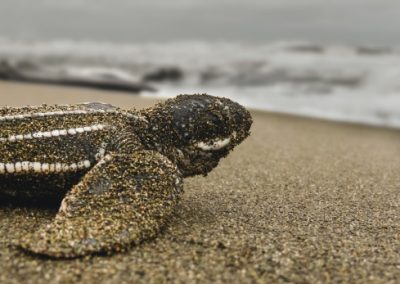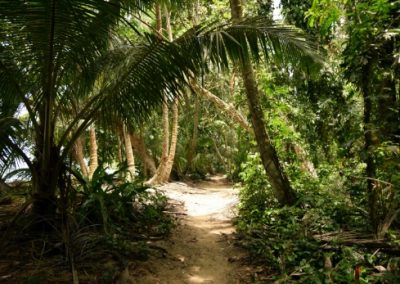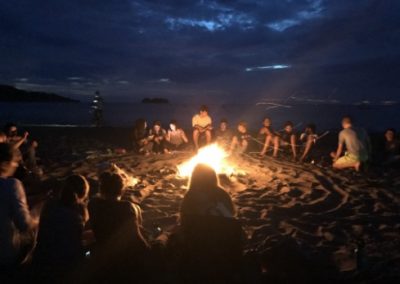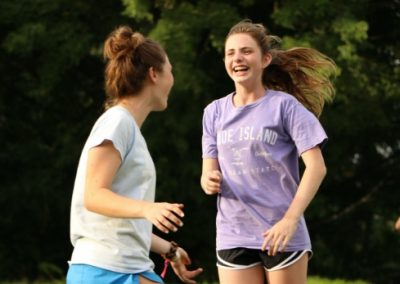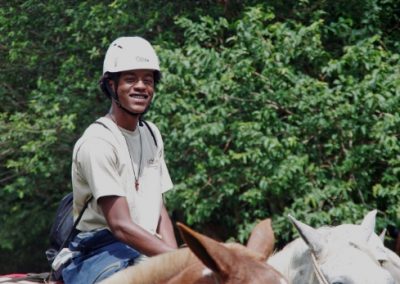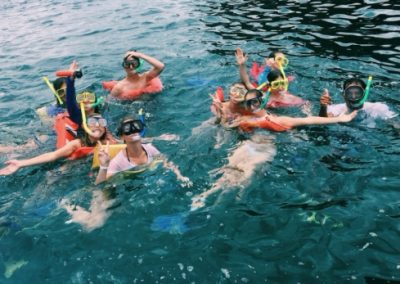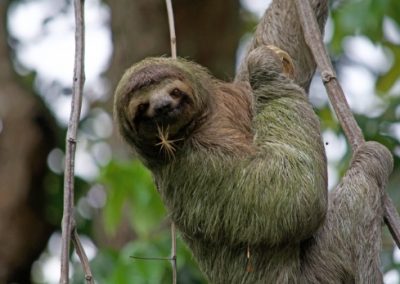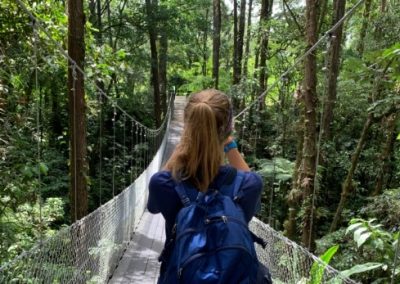Smithsonian Student Travel | Costa Rica
Please note that students must be 16 years old by May 1, 2023 to join this program, due to permit requirements at Tortuguero National Park.
Highlights
-
Assist researchers in data collection at the Sea Turtle Conservancy
-
Embark on night walks to monitor sea turtle populations
-
Learn about small-scale hydroelectricity at a rainforest ecolodge
-
Zipline through the unique cloud forest canopy in Monteverde
Itinerary
This itinerary represents our plan for the program. However, we may implement changes if we identify opportunities to improve the experience, to take advantage of unexpected events, or to accommodate local schedule changes.
Escazu • 2 days • Spend your first two nights at a mountain ecolodge outside of San Jose. Get to know your group and leaders, participate in an in-depth orientation, and spend a day in Costa Rica’s vibrant capital city. Prepare for your travels to Tortuguero National Park.
Tortuguero National Park • 5 days • Travel northeast by private bus and boat to stunning Tortuguero National Park. Take on the role of eco-volunteers as you collaborate with researchers at a biological field station run by the Sea Turtle Conservancy. Shadow researchers on nightly beach walks and learn about the past, present, and future of this delicate marine ecosystem. Become part of a five-decade-long conservation initiative as you participate in data collection, turtle tagging, and night shifts to monitor sea turtle nesting sites of green and leatherback turtle populations. Interview local experts and learn about projects aimed at helping to protect turtles from human interaction, light pollution, and changes in the marine environment. Team up with a local primary school to connect with school children and raise awareness about sea turtle conservation efforts.
La Selva Research Station • 2 days • Next, travel inland to a pioneering tropical ecology research station situated in lush forest. Settle into your field station accommodations, and explore this incredibly biodiverse tropical rainforest ecosystem. Get an insider’s view into the work of a tropical scientist and get up-close with the jungle’s flora and fauna on hikes with guides. Spot sloths and howler monkeys, identify native birds, and embark on a rafting expedition on the tumbling Sarapiqui River.
Monteverde Cloud Forest • 4 days • Continue west to your next destination, a small family farm located just outside the Monteverde Cloud Forest Reserve. Eat delicious, home-cooked Tico meals made with local produce, and settle into your hilltop cabin. Meet your Smithsonian Student Travel Expert and explore trails that wind through the property, taking you through one of the most biodiverse forests in Costa Rica. Visit the Monteverde Institute, participate in an ongoing reforestation project, and learn how local communities are adapting to and mitigating the effects of a changing climate. Zipline through the forest canopy, learn to identify some of the cloud forest’s most unique species, and work on your independent project. Finally, discuss ways you can bring your knowledge home to protect and preserve the ecosystems in your own backyard.
San Jose • 1 day • Return to San Jose, have a final group celebration, and prepare for your travel home.
Return • Travel Day • Fly from San Jose, Costa Rica, to Miami with your group and a trip leader, then continue on to your final destination.
Smithsonian Student Travel Experts
The Smithsonian Student Travel experts highlighted below are examples of professionals that will join the group at various points throughout the itinerary to add their expertise and insight to the program theme.

Dr. Brett Scheffers, Professor of Wildlife Ecology and Conservation
Dr. Brett Scheffers is an Associate Professor in the Department of Wildlife Ecology and Conservation at University of Florida. He currently serves as an Alfred P. Sloan Research Fellow. Dr. Scheffers is the Chair of the Species on the Move international seminar series and the co-Founder of the SE Regional Invasive Species and Climate Change Management Network. He has been a National Geographic explorer since 2014 and a long-time member of the IUCN Climate Change and Biodiversity Specialist Group. Dr. Scheffers obtained his BSc in Ecology at Sewanee: The University of the South, USA, his MSc in Ecology from University of Alberta, Canada, and his PhD in Ecology from National University of Singapore, Singapore. He served as a post-doctoral research fellow at James Cook University, Australia.
Dr. Scheffers runs a dynamic and leading biological conservation and ecology lab and has published over 80 peer-reviewed articles, many of which are in leading international journals such as Science, Nature Climate Change, Current Biology, and Frontiers in Ecology and Environment. His work has been covered by hundreds of news outlets, including The Economist, Huffington Post, National Geographic, Scientific American, and the New York Times. Dr. Scheffers has spent the last 20 years working in tropical ecology and conservation biology across the world’s tropical rainforests of Australia, Southeast Asia, Africa, and Central and South America. He has extensive experience in the field of global change biology and his research focuses on core ecological problems – often using canopy science, the degree of vertical habitat use in montane tropical rainforests, as his model system. His research also focuses on ecological responses and adaptation of a variety of taxa ranging from birds, amphibians, reptiles and insects to climate change and environmental instability.
Brett will be joining the July 14 departure of the Costa Rica Program.

Dr. Neeti Bathala, Ecologist
Dr. Bathala brings almost two decades of experience in higher education, teaching Ecology and Environmental Sciences at both the undergraduate and graduate levels.She will be joining the faculty at Villanova University this Fall and teaching courses in the Environmental Sciences. An ecologist by training, Dr. Bathala has participated in numerous local and global conservation projects. She has degrees from Rutgers University (BS), Temple University (MA), Duke University (MEM) and the University of Georgia (PhD). During her graduate studies at Duke University, Dr. Bathala studied conservation biology in Costa Rica with the Organization for Tropical Studies (OTS). She has spent time at numerous biological research stations in Costa Rica and has volunteered with sea turtle conservation efforts at Tortuguero National Park. In addition to her work in terrestrial ecosystems, Dr. Bathala has been involved in several National Science Foundation (NSF) post-doctoral Chautauqua Field programs studying biodiversity and marine communities in Belize, Hawaii, and the Galápagos Islands. Dr. Bathala has taught several marine-based ecology courses domestically and at the Honduras Roatan Institute of Marine Sciences (RIMS). She is a certified PADI SCUBA diver and has completed day and nighttime dives in the Caribbean and Pacific Ocean. Outside of her academic pursuits, Dr. Bathala is an award-winning author and continues to develop educational children’s books on environmental subjects. Her 2017 publication Moonlight Crab Count won the Children’s Book Council and Science Teachers Association, Outstanding Science Trade Book for 2018 and was selected for the 2021 Children’s Book Reading List for Social Activism. As an author, speaker, and educator, Neeti is involved in community public education on environmental issues. She is deeply committed to projects encouraging STEM, particularly for women in the sciences.
Neeti will be joining the July 28 departure of the Costa Rica Program.
What to Expect
Accommodations • We stay in various types of accommodations throughout this program, including a dormitory at a scientific research station and rustic ecolodges. Students have access to common and outside space at our accommodations for community meetings, working on projects, and socializing. Leaders stay together with students throughout the program.
Climate • Costa Rica is a tropical country with two seasons: wet and dry. Summer is the wet season. It rains often in brief, heavy showers rather than all-day storms. Daytime temperatures range from 75-85°F, while nighttime temperatures drop to 70-75°F.
Meals • We enjoy most meals of traditional Costa Rican cuisine prepared and served at our accommodations. Other times we eat lunch and dinner in restaurants. Occasionally we also purchase supplies for healthy and delicious picnic lunches.
Cuisine • Costa Rican cuisine features a hearty amount of rice and beans, and a delicious array of tropical fruits, such as papaya, mango, and pineapple, at almost every meal. A typical lunch consists of gallo pinto (rice and beans), fish or chicken, vegetables, cheese, tortillas, and fruit.
Enroll in two programs & save $500!
$300 tuition discount + no second application fee

